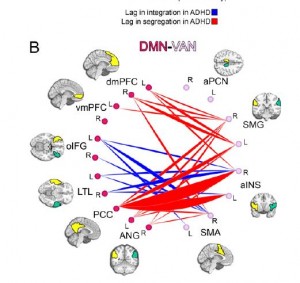Despite a wealth of evidence, the diagnosis of ADHD remains controversial, particularly outside of the medical community. Some research has suggested that ADHD might be better conceptualized as a delay in brain maturation rather than a “disease state” per se. However, more research is needed to support this hypothesis.
The brain imaging literature has increasingly moved away from studies that look at the size or activity of a particular region in isolation and towards the examination of regional networks of several areas that are intrinsically connected to
each other when the brain is doing tasks or at rest. Perhaps the most studied of these networks relates to brain activity when it is not engaged in a particular task. This has been known best as the default mode network or DMN. The present study published in PNAS examines the development of these networks over time between individuals with and without a diagnosis of ADHD.
The study utilized functional MRI scans from a group of 135 individuals with a diagnosis of ADHD and compared them to 188 typically developing controls from ages 7 to 21. To investigate their hypotheses, the authors employed complex analyses called whole-brain connectomic methods which reportedly represent an advance from older techniques that used a small number of “seeds.” These techniques allowed the authors to examine more than 400,000 different brain connections.
With these analyses, the authors did find maturation lags in those with ADHD, particularly within the DMN and between the DMN and two other task positive networks (networks involved in specific cognitive functions), namely the frontoparietal and ventral attention network (VAN). The VAN is involved in salience processing, i.e. detecting the relevant stimuli the external environment while the frontoparietal network is involved in adaptive cognitive control. The implications of both of these networks seem to make sense clinically when considering those with struggle with ADHD.
The authors concluded that their data lend additional support that ADHD is related to important lags in brain maturation in areas that underlie the regulatory control of attention and behavior.
This is an important study published in a highly respected journal. It is also quite methodologically complex and difficult to evaluate on a technical level for those who are not neuroimaging experts. Nevertheless, the study provides ever more increasing and specific evidence that the challenges related to ADHD reflect “real” alterations in brain function and structure.
Indeed, the hypothesis of ADHD as brain maturation delay could offer a compromise between those inclined to dismiss the very existence of ADHD and those who view it from a more traditional disease model. Before jumping on this train, however, I personally would like to see more evidence regarding whether the brain function of those diagnosed with ADHD eventually catches up or whether these differences persist late in life. As far as I can tell, this study does not address this important point.
Reference
Sripada CS, et al., Lag in maturation of the brain’s intrinsic functional architecture in attention-deficit/hyperactivity disorder. PNAS 111(39):14259-64, 2014.
Tags: adhd, brain network, default mode netword, maturation delay


